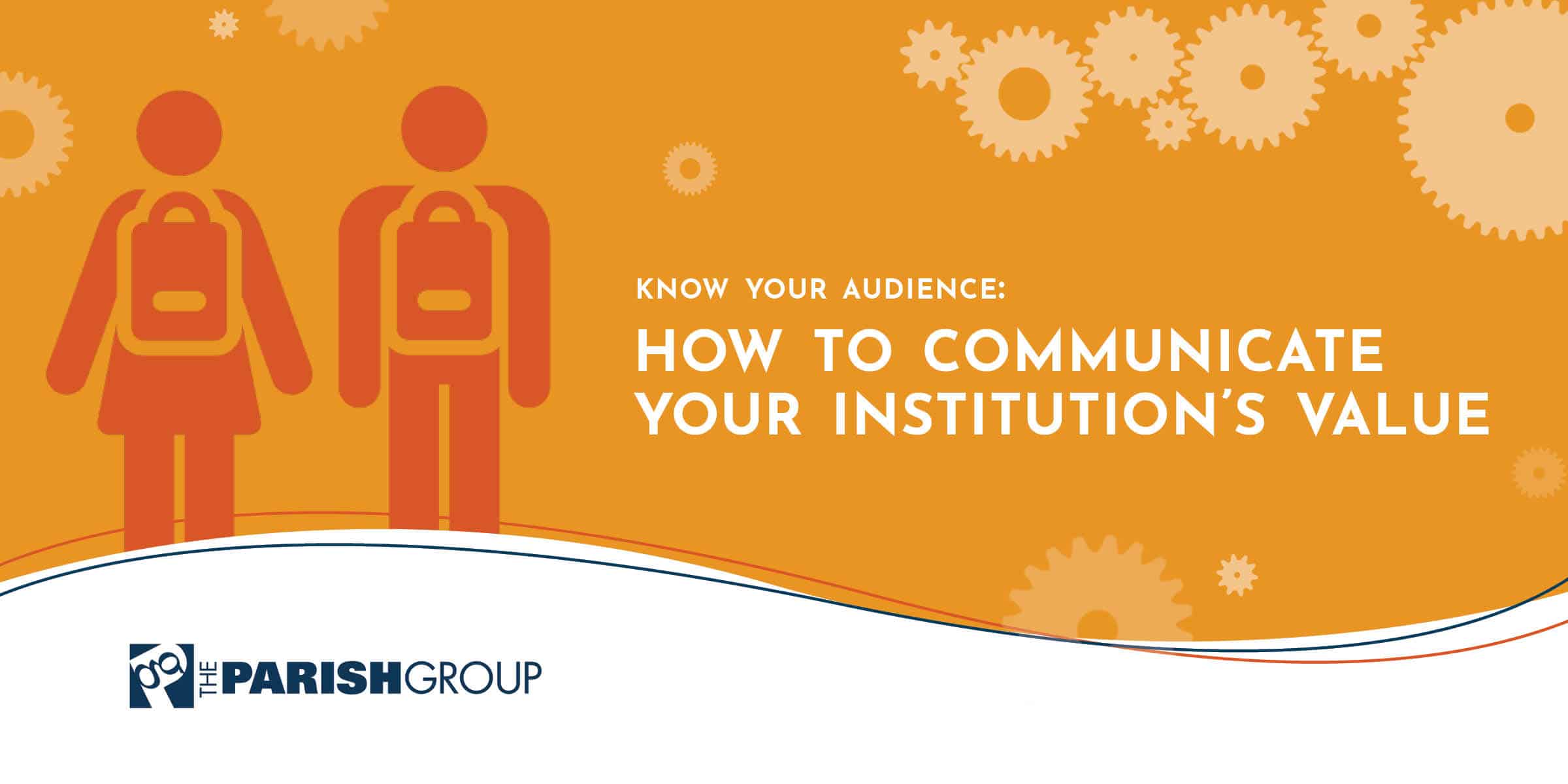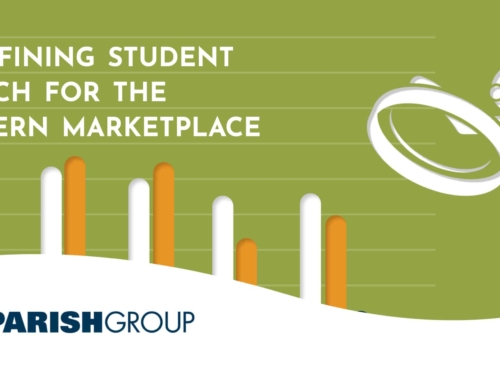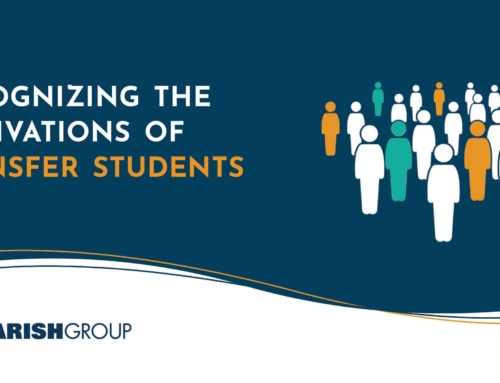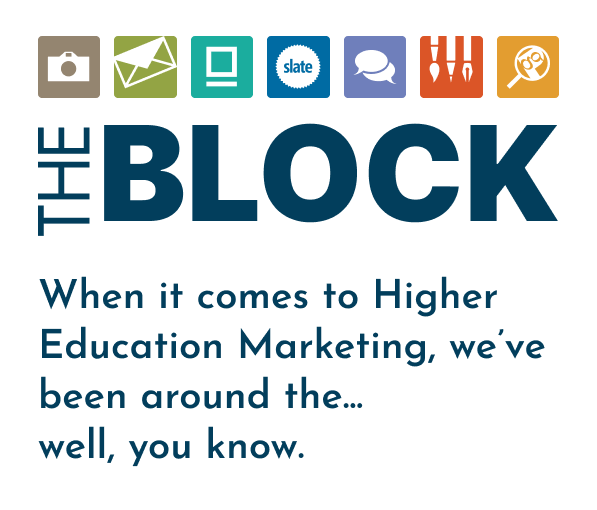
Recent studies have shown that Americans’ confidence in the value of higher education is on the decline.
As higher ed marketers, it’s our job to put ourselves in the shoes of prospective students. But with such a subjective thing as value, how can we help overcome this sinking perception?
For some students, the value of higher education is quantifiable, rooted in data, statistics, rates, and numbers. They seek tangible outcomes and measurable returns on their investment.
Adversely, there are those who place greater emphasis on intangible aspects such as community, dialogue, activism, and social growth. For them, value lies in the transformative experiences and personal development.
We can attribute a declining perception of higher education’s value to various interconnected factors, including curriculum relevance, financial considerations, and post-graduation outcomes.
Addressing these concerns requires a concerted effort to reevaluate and adapt higher ed models to align with evolving needs and expectations.
Each student is unique and will require different information to make an informed decision. By actively listening, we can figure out exactly what they need to hear.
The Career-Oriented Student
In today’s college admissions landscape, there’s a noticeable shift among high school students towards prioritizing the concrete outcomes of a college education. Rather than seeking a sense of community or belonging, these students are laser-focused on the tangible returns they can expect after investing four years of their lives.
You’ll often find these students inquiring about graduation rates, financial aid packages, and employment statistics for graduates in their chosen field. Providing these hard data points may help your institution stick in their minds, but how can we get to the root of their needs?
Effective communication begins with active listening.
By carefully dissecting the questions they ask, we uncover the underlying motivations and concerns driving their thoughts.
For instance, when a student asks about the career paths of program graduates, they might be less interested in the specific companies (sure, big names look great), but more intrigued by the journey those graduates took to get there.
This is where you spotlight the tangible support services your institution offers, such as internships, advising, and career development programs. Rather than inundating them with statistics, highlight practical resources and opportunities to help them succeed in their chosen field.
It’s important to recognize that what works for these outcome-oriented students may not align with the needs of others. By tailoring your approach to meet the distinct preferences and goals of each student, you can ensure they get the guidance and support necessary for their individual paths to success.
The Self-Growth Student
Gen Z is the generation of mental health advocacy. We see this permeate in their college admissions journey.
Some students demonstrate vulnerability in their pursuit of academic and personal growth. They’re more open to reflecting on mental health needs and willing to share personal, familial, or societal stressors that impact their educational journey.
By actively listening to their stories and experiences, we can gain invaluable insights into the forces that shape their identities and aspirations.
Whether they express concerns about mental health services or seek information about safe spaces on campus, these types of students value not only what we have to say but, perhaps more importantly, the opportunity to be heard and understood.
In communicating a supportive and empathetic environment, you can demonstrate your school’s commitment to nurturing the holistic well-being of every student.
Some students just want to feel like they belong. If we can foster that sense of belonging early in the relationship, we can better ensure they’ll feel valued and supported in their undergraduate pursuits.
The Exploratory Student
For many, college is a time to expand world views and gain independence. Certain students crave that sense of adventure and it’s up to you to feature all the ways they can broaden their horizons.
Learn what that missing piece was for them in high school or everything they see themselves accomplishing while earning their undergraduate degree.
Here’s where you discuss various clubs and organizations, research opportunities, study abroad, student leadership roles, and the value of diversity at your school.
These students might often come with a worrisome parent hesitant to let go. Touch on housing so parents can rest assured their child has a safe, comfortable place to sleep at night. Be sure to highlight security measures your school takes to ensure your students’ safety.
Finding Balance
Remember that not every student will fit into a nice tidy box; after all, personality archetypes only get us so far.
Active listening gets you farther. Whether you’re at a college fair, communicating via email, or guiding a tour, enter these conversations knowing that effective communication and relationship building starts with listening.
Although students may exhibit distinct differences in their preferences and priorities, the overarching need to communicate the value of higher education remains.
As college-going rates decline and overall perceptions of the value of higher education go with it, the key is to convey the intrinsic value of college in a way that resonates with each individual.
Strengthen Your Communication Skills with The Parish Group
If you’re looking to improve your team’s communication and relationship-building skills, The Parish Group is at your service.
We offer counselor training that focuses on communicating value, closing the deal, and even how body language and presentation can influence a discussion.
With over 35 years in the higher education marketing and enrollment management industry, The Parish Group is your one-stop-shop for engaging prospects and increasing your enrollment.
Let us know how we can help you succeed. Reach out at success@parishgroup.com or call our office at 828-505-3000.







